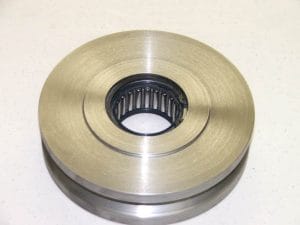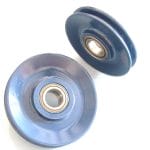How Do I Take Care of my Sheave or Pulley?
When you are looking to get the longest possible life out of your sheave or pulley, you have to know some key maintenance tips. Before diving into the best ways to protect your sheaves and pulleys, lets learn a bit more about how these products work. Pulleys and sheaves are the mechanisms that allow wire rope to turn corners and hoist heavy loads. Throughout the course of their working life, these simple machines rotate thousands, and even millions of times, bending wire rope along with each turn.

Though sheaves and wire rope work together seamlessly when properly maintained, issues such as kinking and abrasion are more likely to occur if a system is neglected or damaged in any way. Rather than leaving improperly assembled sheave systems to break, there are ways you can prevent the problem entirely. Additionally, ignoring hazards to your sheave application not only increases damage to other equipment in the system, it also places personnel in imminent danger if small issues escalate to total failure. That is why sheave maintenance is not only important; it is essential.
Kinking in your wire rope is sometimes caused by improper handling or installation, but it is usually triggered by using incorrectly sized, or damaged sheaves. Kinks are created when wire rope is twisted over itself into a tight loop, and then pulled straight. This movement causes permanent damage to the cable, leaving a bent or curved bump that cannot be straightened. If a cable undergoes unintended twisting when passing over a sheave, or if excessive slack in the pulley system causes the cable to shift or rotate out of alignment, the cable may build tension until it kinks. Even if a kink looks mild, the rope must be taken out of service immediately to prevent further degradation. To find the source of the issue, inspect your system for damaged or worn sheaves, and replace any units that show signs of crushing, warping, and deformation. It is never worth it to leave a seemingly damaged pulley in use as it will only continue to cause further complications to your entire system.
Abrasion is another factor to look out for when maintaining your sheave or pulley. If your pulley is frozen or stuck, or if its grooves have distorted due to excessive wear, it could be shortening the cycle life of your cable due to abrasion. Unlike kinking, which is created by isolated incidences, abrasion results from repeated friction and compression imparted on the outside wires of a cable by damaged sheaves. If you notice smooth sections on your cable, it is time to assess your system and address any issues with both the pulleys and cable. The cable will eventually break if left unaddressed, so take the time to thoroughly inspect all components.
Once you locate damaged sheaves, visit eSheaves to begin sourcing your high quality custom and stock replacements. For quick delivery on ready-made custom sheaves, we recommend specifying a steel pulley from QSheaves™. QSheaves™ ship from stock very quickly, allowing you to get the replacements you need on time. If you are looking for a lightweight option, we recommend our process sheaves. Process sheaves are available in numerous materials, including specialty materials such as Teflon and or Nylon. Our process sheaves offer stock and custom solutions with the widest range of performance plastic materials available in the industry. Finally, if your system relies on OEM sheaves from Crosby McKissick, we offer OEM options that can be found here.

Ensure your system is safe and efficient by routinely inspecting and maintenance all necessary components, and replacing worn units before they create safety hazards. To see our full range of pulleys and sheaves for lifting and processing applications, visit eSheaves. Do not hesitate to contact us with any questions. You can reach out to us by email at sales@esheaves.com or by phone at 239.643.LOOS (5667).